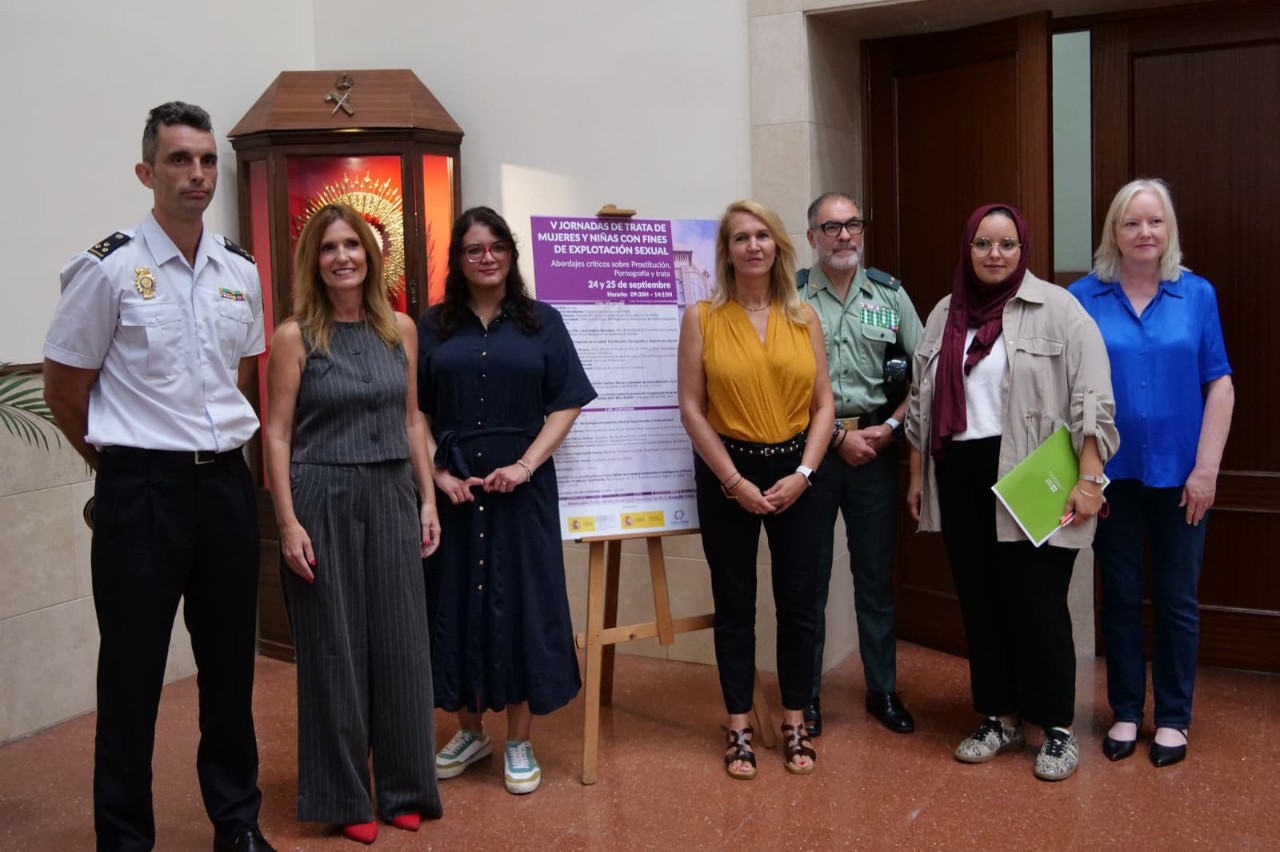The second day of the V Conference on Trafficking in Women and Girls for the Purpose of Sexual Exploitation organized by the Government Delegation addresses emerging technologies, which have become “spaces for recruitment but also exploitation for women and girls”.
The Head of the Coordination Unit against Violence against Women, Laura Segura, in statements to the media, has stressed that trafficking, prostitution and pornography “are forms of violence against women that converge and are faces of the same coin: the exploitation of women.”
The Civil Guard Command today hosts the second day of the V Conference on Trafficking in Women and Girls for the Purpose of Sexual Exploitation, organized by the Government Delegation in Melilla, in the framework of the International Day against Trafficking in Women and Girls for the Purpose of Sexual Exploitation, which is commemorated every 23 September.
Segura recalled that the first session analyzed how this crime affects the physical and mental health of the victims, their emotional well-being and the “absolute tear” that it entails in their lives, as the speakers explained. In this regard, he stressed the importance of coordination between institutions and administrations to accompany victims from a “vision seen and authentic”.
Today, Segura said, the central focus is on emerging technologies, such as catchment and exploitation spaces for women and girls.
The Head of the Unit has warned that the available data reflect only women formally identified as victims, which makes invisible the reality of many others that have not been recognized as such. Therefore, she has insisted on the need to strengthen detection and give voice to the stories of women themselves, an aspect in which specialized entities play a key role.
In the session that is taking place right now, issues such as pornography, prostitution, pimping and the importance of pointing out both the demand and those who exploit women will be addressed. In addition, the new forms of recruitment and prevention that must be promoted by the administrations will be analyzed.
The program includes a main presentation on artificial intelligence applied to these emerging technologies, as well as a round table in which state security forces and bodies, the Provincial Director of Education and specialized entities such as Cruz Blanca participate.
Prevention in the classroom
The Provincial Director of Education, Elena Fernández Treviño, who participates in the round table “Emerging technologies: challenges in prevention and intervention”, has highlighted the fundamental role that education has in the prevention of sexual violence, especially in a context in which social networks are part of the daily socialization of adolescents and young people.
“These boys and girls move 24 hours in these networks, and we are building on a socialization that is often unknown by the professionals who face the classrooms,” he said, warning that this exhibition poses great risks, especially for girls, and that “without a doubt, it will be translated in the classroom.”
The Provincial Director recalled that in many workshops it is the adolescents themselves who claim that preventive education “arrives late”, and has defended the need for early sex education in school to avoid problems that subsequently impact on educational centers. “This violence is present outside and inside the centers; we have to know it to prevent, detect and deactivate it,” he said.
Although educational centers do not intervene directly in cases, they do have the ability to detect and refer the right professionals to act and avoid situations of risk. In this regard, Fernández Treviño has congratulated the organization of these days, “very important because they have equality leaders and teams of educational centers that are here to listen and know about issues that are happening and that must be deactivated”.
He has also warned about the “potential dangerousness” of social networks and the new socialization mechanisms that generate: “When we say that there are no cases of trafficking in Melilla, we know that these data are not true. Here we have organizations and professionals that corroborate it.” In addition, it has stressed that teacher training is essential to recognize and detect these realities.
The students arrive in the classroom influenced by “a culture of patriarchal socialization that affects their lives directly”, he has warned and warned that these digital platforms can become “new forms of prostitution and pimping”, before which he has asked for maximum caution.
New technologies and sexual exploitation
The head of IT and Digital Transformation at the NGO Fiet, Marlene Moreno, lecturer in the “Prostitution in the digital age: emerging technologies and artificial intelligence” has explained that her intervention will revolve around how new emerging technologies, artificial intelligence, are influencing sexual exploitation through the Internet.
He is also going to take a tour of the history of pornography on the Internet, “which is very important of how it has evolved, of how before pornography in the 80s, that there was not even the Internet, as we know it, there were already first pornographic images”.
Moreno has pointed out that, according to data from the study of Dr. Luis Ballester, 87% of young people in Spain consume pornography.
